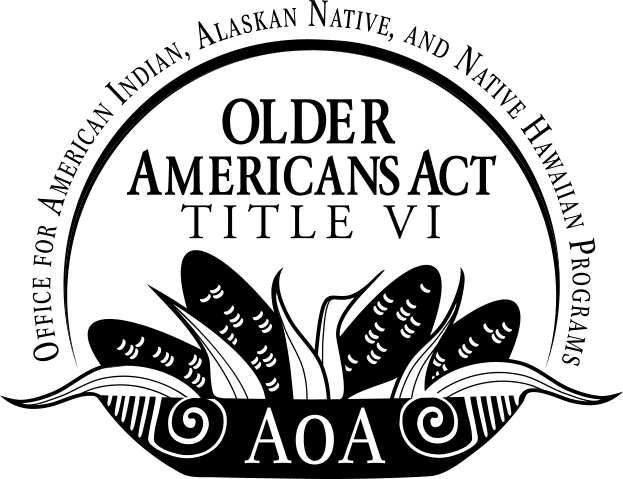This site is being reviewed and updated as needed to comply with President Trump's executive orders.
Recent News
Title VI programs only need to request approval from ACL now for any single supply or equipment purchase over $10,000 instead of $5,000. We have updated the information on our website as well as our documents to reflect these changes. If you have any questions about this new policy, then please contact your Regional Administrator (RA).
November 18, 2024
Visit our new Veterans webpage for important links, phone numbers, and general information about the main services offered by the U.S. Department of Veterans Affairs (VA). The page also lists tribal governments that offer additional support for veterans and provides direct website links.
November 7, 2024
Check out the new “Title VI Spending Guide“ (PDF | 245 KB) which now includes a Gardening section!
If you build a Title VI Garden, then please let us know and send any photos you may have to: titleviarchive@acl.hhs.gov
July 11, 2024
Please send any Title VI related program photos you would like to share to: titleviarchive@acl.hhs.gov
Once received, you will be asked to complete a photo release form if you would like us to share your photos with others.
March 11, 2024
Announcements
This USDA program provides affordable funding to develop essential communities facilities in rural areas. An essential community facility is defined as a facility that provides an essential service to the local community for the orderly development of the community in a primary rural area, and does not include private, commercial, or business undertakings. Funds can be used to purchase, construct, and/or improve essential community facilities, purchase equipment, and pay related project expenses.
Learn more here.
October 16, 2024
The Administration for Community Living (ACL) is pleased to share our final Tribal Consultation Policy. The policy, effective today, highlights ACL’s commitment to better serve Native elders, people with disabilities, their families, and their caregivers. This policy aligns with several key objectives of ACL's programs and policies, including addressing health and human services disparities among Indians, improving access to essential health and human services, and promoting the social, physical, mental health, and economic well-being of Indian communities. To achieve these goals, to the extent practicable and permitted by law, it is essential that Federally recognized Indian Tribes and ACL engage in open, continuous, and meaningful consultation.
Included in this announcement are ACL's Tribal Consultation Policy and the accompanying Dear Tribal Leader Letter. We encourage review of these materials but also note that the ACL team is available to answer questions or provide technical assistance.
We are excited to launch a new way of collaborating with Indian tribes and continue to grow our partnership with your communities.
September 10, 2024
If you have older veterans or other older adults with behavioral health issues in your Title VI program, then be sure take a look at this updated 2024 version of the Older Veteran Behavioral Health Resource Inventory from the U.S. Department of Veterans Affairs (VA). This resource was developed in collaboration with ACL, along with a number of other agencies and organizations, to provide information that can help health and social service professionals support older veterans and other older adults who have or are at risk for behavioral health conditions, including posttraumatic stress disorder, suicide prevention, long-term services and supports, and much more.
July 30, 2024
The U.S. Department of Health and Human Services, through its Administration for Community Living, released “Aging in the United States: A Strategic Framework for a National Plan on Aging.” The report lays the groundwork for a coordinated effort – across the private and public sectors and in partnership with older adults, family caregivers, the aging services network, and other stakeholders – to create a national set of recommendations for advancing healthy aging and age-friendly communities that value and truly include older adults. You can help shape the national plan on aging by completing a short survey here.
June 18, 2024
ACL Released the 2023 Profile of Older Americans, a summary of the available statistics related to the older population in the United States. Principal sources of data are the U.S. Census Bureau, the National Center for Health Statistics, and the Bureau of Labor Statistics. The Profile illustrates the shifting demographics of Americans 65 and older. It includes key topic areas such as future population growth, marital status, living arrangements, income, employment, and health.
June 11, 2024
Be sure to check out this new Comparison Chart for the OAA!
Please note that this chart is intended for informational and summary purposes only. The final rule, published in the Federal Register and codified in the Electronic Code of Federal Regulations, is the official document that should be referenced regarding requirements for OAA programs, until the Code of Federal Regulations is updated after October 1, 2024.
June 10, 2024
The Biden-Harris administration’s U.S. Department of Health and Human Services (HHS), through the Administration for Children and Families (ACF), recently reaffirmed its commitment to harnessing resources to confront the crisis of Missing and Murdered Indigenous People (MMIP) by releasing an updated action plan. This updated action plan reinforces and enhances ACF’s ongoing efforts to prevent violence to Native people and communities by promoting healing from historical trauma and present-day victimization.
The ACF MMIIP Action Plan, entitled The Culture is Prevention: A Strength Based, Culturally Grounded Journey Toward Prevention, Intervention, And Healing, advances the whole of government commitment to addressing the MMIP crisis through a multipronged approach that includes preventing violence and promoting healing from historical trauma. Most importantly, it adopts responsive administrative processes such as self-governance and Indigenous knowledge, as well ways to leverage ACF’s grant funding, community engagement and rulemaking authority.
May 3, 2024
Last Modified: 10/25/2024

